Paul David Pope: The Deeds of My Fathers
December 12, 2010 by David
Filed under Non-Fiction, WritersCast
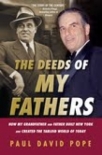 978-1442204867 – Hardcover – $24.95 – Philip Turner/Rowman & Littlefield (e-book editions available at $9.99)
978-1442204867 – Hardcover – $24.95 – Philip Turner/Rowman & Littlefield (e-book editions available at $9.99)
Well this is truly an amazing 20th century American story, and really well told by the author, who spent many years working on this book. There are characters here as big as those in any historical novel. The full title of the book gets to what the story is about: The Deeds of My Fathers: How My Grandfather and Father Built New York and Created the Tabloid World of Today.
Paul David Pope’s grandfather, Generoso Pope Sr., came to this country alone and poor, at a very young age seeking a better life, as so many other immigrants did. That part of the story is hardly unique. But he was obviously a very special sort of person, and it did not take him very long, through hard work, intelligence and a certain amount of ruthlessness, to create a building trades empire in the greatest city in America, New York City.
His companies supplied the concrete that literally built the city in the boom years of New York. But he also managed to buy and control this country’s primary Italian language newspaper, Il Progresso, and his wealth, power and connections (including political kingmakers, the mob, and even FDR as well as the Pope) made him one of this country’s leading and most influential Italian Americans. Because he was able to use his newspaper to influence elections, he essentially became a kingmaker in the old school of American politics, and was truly an iconic emblem of his times.
But author Pope does not shy away from telling us the ugly along with the good. His grandfather was far too close to Mussolini in the 1930s, and was blatantly used by the Fascists to try to influence American public opinion in their favor during the lead up to World War II. And he was far from being a good husband and father. He always favored his youngest son, Gene (author Pope’s father), and selected him to run his businesses, over his older and more experienced brothers.
Early on, Gene Americanized his name to Pope. He was pushed out of the family business after his father’s death by his mother and his two older brothers. At that point, Gene, with a loan secured from his “Uncle Frank” Costello, bought a newspaper in decline, the New York Enquirer. With a combination of dedication and a brilliant natural understanding of what average readers would want to read, he created the pinnacle of all tabloids, the National Enquirer. Of course, the support of his Uncle Frank did not come without strings, and Frank required that the paper stop attacking the mob in its stories, and in fact it was to publish only positive stories about projects the mob was backing, and even that the Enquirer would attack and discredit the enemies and opponents of organized crime – which it did without hesitation.
But the heart of Gene Pope’s story is his single minded dedication to the newspaper he loved. He moved the company to Florida and made it almost the only thing he cared about. As he grew older, he was clearly eccentric in his behavior (some might say nighly neurotic and disturbed). But throughout, Gene Pope gives readers what they want, and as the National Enquirer covers the paranormal, medical cures, celebrities, always attentive to what the average American would read, and circulation soars, peaking with the 7 million copies sold of the Enquirer’s 1977 exposé on the death of Elvis Presley.
Paul David Pope gives us a fast paced, almost novelistic version of his family’s history. His story is based on hundreds of interviews, and a huge amount of research, but of course much of what happened in the earlier part of the story is reconstructed from the documentary record. It is a gripping narrative, and a compelling story for anyone who cares about the modern history of the United States as lived by some of its more colorful and successful citizens, and the author gets across the complexity of his real life family in their non-stop rush to make their marks.
Talking to the author gave me a chance to delve into the background of the story, what motivated Paul to do all this work and stay with it for so long, and for him to talk about how his family history has affected his own life. There’s more about the book at the author’s website too.
Podcast: Play in new window | Download
Publishing Talks: David Wilk Interviews Betsy Lerner
December 9, 2010 by David
Filed under Publishing History, PublishingTalks, The Future
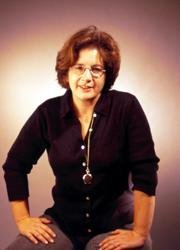 In this series of interviews, called Publishing Talks, I have been talking to book industry professionals and other smart people about the future of publishing, books, and culture. This is a period of disruption and change for all media businesses. We must wonder now, how will publishing evolve as our culture is affected by technology, climate change, population density, and the ebb and flow of civilization and economics?
In this series of interviews, called Publishing Talks, I have been talking to book industry professionals and other smart people about the future of publishing, books, and culture. This is a period of disruption and change for all media businesses. We must wonder now, how will publishing evolve as our culture is affected by technology, climate change, population density, and the ebb and flow of civilization and economics?
I hope these Publishing Talks conversations will help us understand the outlines of what is happening, and how we might ourselves interact with and influence the future of publishing as it unfolds.
These interviews give people in and around the book business a chance to talk openly about ideas and concerns that are often only talked about “around the water cooler,” at industry conventions and events, and in emails between friends and they give people inside and outside the book industry a chance to hear first hand some of the most interesting and challenging thoughts, ideas and concepts being discussed by people in the book business.
A few weeks ago I read a piece by Betsy Lerner in Publishing Perspectives, the excellent online newsletter about the publishing business edited by Ed Nawotka. It was called “Should I Tweet” and was adapted from the new updated edition of Betsy’s book “The Forest for the Trees: An Editor’s Advice for Writers.” It’s a great piece, that says some important things about marketing and publishing aimed at writers (but good for everyone else in publishing to read too), and instantly made me want to talk to her (and buy her book). This little quote from near the end of the essay really grabbed me:
“I’m not saying that everyone can or should be creating a personal literary dynasty, but it’s essential for authors to be thinking about how to market themselves. Always has been. Sometimes they cry, “but I’m no good at marketing,” or “Isn’t that the publisher’s job?” I think publishers should help authors think about what they can do early on in the process, whether it’s creating a blog, developing mailing lists, or getting speaking engagements lined up. If you’re lucky enough to be signed up without a platform, start working on one! Marketing and selling books is not for the faint of heart. Whitman knew that. Palahniuk knows it. Jay Conrad Levinson preaches it.
But no one knew it better than P.T. Barnum, “Without promotion something terrible happens,” he said. “Nothing!”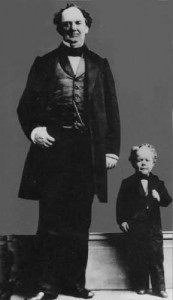
Betsy is herself of course, a terrific writer, as well as being a successful agent. I admire her blog, where she extends the work she did in The Forest for the Trees. She is funny and smart, entertaining and instructive, and obviously talented. Her opinions are definitely worth knowing, and her advice for writers is always great stuff. She’s a poet, and was for many years a successful commercial editor, and then became an agent with a great list of client writers; she is a partner at the Dunow, Carlson and Lerner Literary Agency. She wrote another book called Food and Loathing about her issues with eating and depression. She received an MFA from Columbia University in Poetry and was the recipient of a Thomas Wolfe Poetry Prize, an Academy of American Poets Poetry Prize, and was one of PEN’s Emerging Writers in 1987. She also received the Tony Godwin Publishing Prize for Editors Under 35. And Betsy also gives talks on every aspect of the publishing process from her perspective as a writer, former editor and agent.
We had a great conversation about books, publishing and marketing, during which I learned a few things and gained some valuable insights. A key point she makes is how important it is for writers to understand their role in the publishing process. While we are certainly in a period of heightened difficulties, the challenges writers (and publishers) face today are really not that different from what they have always been. The specific tools we use may change, but the principles of marketing books remain the same. Writers are in fact entrepreneurs, and not just “writers” and they must always be engaged in the public process of publishing, in a measure most likely equal to their own actual abilities. And she also reminds us of the central matter: that the quality of the work must always be the focus of everything. Everything else is secondary.
After talking to Betsy, I’m now looking forward to reading The Forest for the Trees – and sooner rather than later.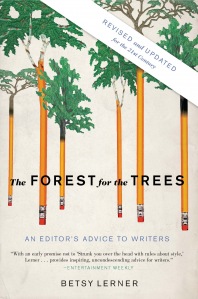
Podcast: Play in new window | Download
Kevin Baker: Luna Park (Graphic Novel)
December 5, 2010 by David
Filed under Fiction, Graphic Novels, WritersCast
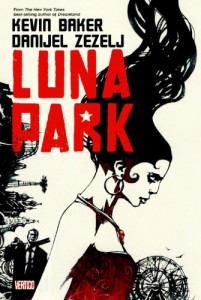 978-1401224264 – paperback – Vertigo – $14.99
978-1401224264 – paperback – Vertigo – $14.99
Luna Park is an outstanding first graphic novel by historian and novelist Kevin Baker. Baker is certainly well-known for his best selling New York City based trilogy of historical novels (Paradise Alley, Dreamland and Strivers Row). And recently he was the consultant for the History Channel’s extremely fine mini-series, America: The Story of Us, as well as being the author of its companion book.
Luna Park is centered on a former Russian soldier, Alik, who fought in Chechniya now living in Coney Island, working as the enforcer for a small time Russian mobster. He is addicted to heroin, and haunted by his memories of the horrors of the war and his own part in it. He desperately loves the prostitute Marina, whose daughter is held captive by the mob boss as a way to keep her under his control.
Alik comes up with a desperate plan he has convinced himself will save Marina, her daughter and himself. It’s at this point that the story takes a turn, as Alik discovers he is destined to repeat his past lives repeatedly, including a few pasts the present Alik does not know he had. There are flashes from present- day run down Coney Island to the Russia of 10 years ago during the Second Chechen War to an earlier time period in Coney Island, when the area was at its peak as an amusement park that really was amazing to behold.
Baker keeps us traveling with him throughout, even though the story is complex, the pain palpable and the suffering of the characters in their struggles seems to never let up. The work of the artist Danilej Zezelj is perfectly suited for this story. His art is dark, powerful and energetic, and adds tremendously to the strength of the story. DC Comics deserves praise putting Baker and Zezelj together, it’s a terrific collaboration.
Kevin Baker and I talked at length about this, his first graphic novel, both in the context of his work as a fiction writer and historian, and of course his deep interest in the City of New York, especially its seamier areas like Coney Island, as well as how writing a graphic novel in collaboration with an artist is different from other types of writing. we were able to range widely about a number of other subjects, making this conversation one I hope listeners will particularly enjoy.
Podcast: Play in new window | Download
Dori Ostermiller: Outside the Ordinary World
November 28, 2010 by David
Filed under Fiction, WritersCast
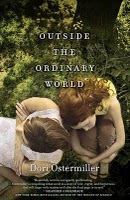 978-0778328896 – paperback original – Mira Books – $14.95 (ebook edition available at a lower price)
978-0778328896 – paperback original – Mira Books – $14.95 (ebook edition available at a lower price)
Dori Ostermiller’s Outside the Ordinary World is a very strong and compelling novel, hardly recognizable as a first novel. The novel’s main character, Sylvia, is an artist and teacher who is grappling with the messiness and unhappiness of her life. She’s distanced from and frustrated with her husband enough to risk an affair with the somewhat exotic father of one of her students. Since this is in many ways a reflection of Sylvia’s own experience as a child, when her mother spent years in her own affair, it triggers Sylvia’s memories and ambivalence about much of her own life and thus her unfolding story.
The story unfolds as Sylvia remembers her past and of course must reconnect with her family while she is trying to reconcile her own situation. We learn about her unusual upbringing as a Seventh Day Adventist, her father, the mercurial and unhappy doctor, who abused his wife and children, and her mother, so unhappy and conflicted that she allowed (or forced) her daughters to participate in her complex “other” relationship, a lack of boundary drawing that has long term ramifications for Sylvia in her own life. We also meet her grandparents and her sister in the present, for further complications to her situation.
It’s risky turf for any writer to take on love, marriage, trust, infidelity and family history with a story line and characters so close to her own. But I think imagination and creativity using the “stuff” of one’s own apparent life is precisely where the most powerful art comes from. Ostermiller writes beautifully about complex human relationships and tells a difficult story well. In many ways this novel defines how fiction really works and works best – taking the difficult journey of the soul to resolve difficult emotional and psychic issues (for both the author and the reader). I really enjoyed this book, as different from my own life experiences and situations as it was. And it was great fun to talk to Dori about her work, the issues of fiction and the mysteries of human love.
Dori Ostermiller teaches writing and literature in Western Massachusetts. She is the founder and director of Writers in Progress, a literary arts center housed in the Arts & Industry building (a refurbished old brush factory) in Florence. Many of her students have published books of their own, including Alison Smith, Kris Holloway, Ellen Meeropol, Kyra Anderson and David Lovelace.
Dori is currently working on her second novel in Northampton, where she lives. Her website is worth a visit. And I for one am looking forward to reading her next novel.
Podcast: Play in new window | Download
Publishing Talks: David Wilk interviews Rich Freese
November 22, 2010 by David
Filed under Ebooks and Digital Publishing, PublishingTalks, The Future
 In this series of interviews, called Publishing Talks, I have been talking to book industry professionals and other smart people about the future of publishing, books, and culture. This is a period of disruption and change for all media businesses. We must wonder now, how will publishing evolve as our culture is affected by technology, climate change, population density, and the ebb and flow of civilization and economics?
In this series of interviews, called Publishing Talks, I have been talking to book industry professionals and other smart people about the future of publishing, books, and culture. This is a period of disruption and change for all media businesses. We must wonder now, how will publishing evolve as our culture is affected by technology, climate change, population density, and the ebb and flow of civilization and economics?
I hope these Publishing Talks conversations will help us understand the outlines of what is happening, and how we might ourselves interact with and influence the future of publishing as it unfolds.
These interviews give people in and around the book business a chance to talk openly about ideas and concerns that are often only talked about “around the water cooler,” at industry conventions and events, and in emails between friends and they give people inside and outside the book industry a chance to hear first hand some of the most interesting and challenging thoughts, ideas and concepts being discussed by people in the book business.
Rich Freese is well known in the book business as a successful member of a very small “fraternity” of distribution experts who work in and understand the intricacies of sales, marketing, warehousing, logistics, and balancing customer and client relationships. He has worked in publishing for his entire adult life. He’s a smart, dedicated and forward looking professional. Rich worked for independent publisher distributor National Book Network for a number of years, moved on to run Motorbooks International, a specialist publisher and distributor, then became President of west coast based Publishers Group West, and after a brief stop establishing a distribution division for the printer, Bookmasters, and has now returned to be the President of NBN, which is based in Lanham, Maryland.
Because book distributors stand in the middle of the supply chain, their worldview is often broader than other entities within the book business. Rich’s breadth and depth of experience in publishing and distribution gives him a unique vantage point from which to view and understand the publishing industry. I thought it would be interesting to talk to him broadly about his current perspective on the ongoing changes in the industry, with some special reference to developing e-book distribution models, the particular issues for independent publishers, and the evolution of publishing models. This talk ought to be particularly useful for independent publishers and anyone interested in their future in a chaotic, challenging marketplace for books.
Podcast: Play in new window | Download
Ilyon Woo: The Great Divorce
November 18, 2010 by David
Filed under Non-Fiction, WritersCast
 978-0802119469 – Hardcover – Atlantic Monthly Press (ebook versions available $9.99)
978-0802119469 – Hardcover – Atlantic Monthly Press (ebook versions available $9.99)
Ilyon Woo’s The Great Divorce: A Nineteenth-Century Mother’s Extraordinary Fight Against Her Husband, the Shakers and Her Times is an absolutely terrific work of historical narrative. The book tells the story of Eunice Chapman, whose husband left her, taking their children, to join the Shaker community near Albany, New York in 1814.
At that time, women had virtually no rights in society. Upon being married, they literally lost their identities, which were subsumed completely into the legal identity of their husbands. So when Eunice’s husband joined the Shakers, a radical Christian sect that espoused celibacy, communal living and the literal separation of the sexes (ironically giving women a much greater role in their communities than was common in the larger society), she had no legal way to gain custody or even visitation with her children. Rather than give up her children to her husband and a religious community with whom she did not agree, she fought her husband and the Shakers for the return of her children.
Ilyon Woo tells the story of Eunice Chapman’s years of struggle to regain her children, which is amazing in itself, given the barriers she had to overcome, not to mention the difficulties of time and distance, which made everything slower and more complicated to resolve. But of course this is also a social history of an era many of us know very little about. It’s a period when women are only just beginning to exercise social power, 30 after the establishment of the United States as a country, 100 years before women win the right to vote.
Through the lens of Eunice Chapman and her heroic struggle, Woo is able to bring this period vividly forward. We learn a great deal about the Shakers, their history, many of the individuals who made the Shaker sect at least temporarily a very successful, though highly controversial religious and social community, and the nature of their daily lives. And her portrayal of the city of Albany and the New York state legislature is absolutely terrific. Woo succeeds in highlighting individual human beings living their lives within the social and historical sweep of their times. There’s a great deal of research here that has been transformed by imagination and her terrific sense of story into a vivid portrayal of an otherwise obscure piece of social history.
This is Ilyon’s first book. I wanted to talk to her about what got her interested in this subject, and learn more about the kind of research she did to be able to tell this story. And also to learn more about how she feels about this period and the people she wrote about. It’s an amazing story that can and should help anyone faced with any challenge find it easier to rise to the occasion, especially since this is a story with a true happy ending.
Ilyon Woo’s website is here. The site features a video about the book, links to more information about the Shakers, and a really interesting tab about the dramatic readings from the book that the author has organized. Here is my favorite quote about the book: “By delving so deeply into the sources, Woo brings the past to life in all its wonderful strangeness, complexity, and verve. This is what history is all about.” —Nathaniel Philbrick, winner of the National Book Award.
Podcast: Play in new window | Download
Corinne Demas: The Writing Circle
November 8, 2010 by David
Filed under Fiction, WritersCast
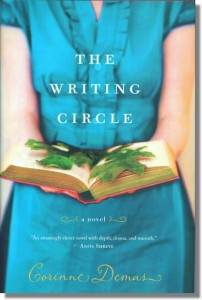 978-1401341145 – Hardcover – $23.99 (e-book edition available $11.99)
978-1401341145 – Hardcover – $23.99 (e-book edition available $11.99)
In choosing books for Writerscast, I have been trying to read as many books as possible from different styles, genres and viewpoints, to make an eclectic and interesting selection both for myself and for an audience of listeners. I suspect that if it had not been for that effort, I simply would never have discovered Corinne Demas and her new novel The Writing Circle.
It’s not so much that this novel is outside the scope of my literary tastes, as in fact, I really like well written novels that explore character and whose narrative is subtle and skillfully enough handled that I can’t feel ahead what is going to happen. I suppose in one way that just means I like to lose myself in a novel and not feel like I can feel the wheels and levers turning as I follow on. But I just may not have picked this book off of a book display in a bookstore to read, maybe because it’s a book about writers and that might normally seem sort of self reflexive to me. Thus the lesson, if there is one, is to remain open to surprises and to not make judgments about a book just from it’s title. A funny idea indeed.
I definitely enjoyed reading this novel quite a bit. Corinne Demas is a very fine writer. I think the word that comes to mind for me is “deft.” There are a number of characters here, all of whom are important, and the way the story is told reminded me of an ever tightening spiral, as we start from the seeming mundane outside and move ever closer into the lives of these people around a series of events that provides the structure of the book. This is a very well put together novel. After reading it, I wanted to rush out and talk to Corinne Demas about the book and how she imagined it, and all the characters (guessing of course that she had been in writing circles herself).
I always feel that when I am talking to a novelist it’s critical to balance between talking engagingly about a book I just read and that I feel excited about, and not giving away too much to anyone who might be listening and themselves eventually read the same book. That certainly applied in this talk, as we danced around the story outline while talking in depth about the book’s structure and her involvement with these very compelling characters. That was fun too and I hope listeners will enjoy that balancing act.
Corinne Demas is a talented and accomplished writer – she’s written adult novels, short stories, children’s picture books and chapter books, a play and she writes poetry as well. In addition, she teaches full time at Mt. Holyoke, which we also talked about a bit in this conversation. 
Podcast: Play in new window | Download
Publishing Talks: David Wilk interviews Liza Daly
November 5, 2010 by David
Filed under Ebooks and Digital Publishing, PublishingTalks, Technology, The Future
 In this series of interviews, called Publishing Talks, I have been talking to book industry professionals and other smart people about the future of publishing, books, and culture. This is a period of disruption and change for all media businesses. We must wonder now, how will publishing evolve as our culture is affected by technology, climate change, population density, and the ebb and flow of civilization and economics?
In this series of interviews, called Publishing Talks, I have been talking to book industry professionals and other smart people about the future of publishing, books, and culture. This is a period of disruption and change for all media businesses. We must wonder now, how will publishing evolve as our culture is affected by technology, climate change, population density, and the ebb and flow of civilization and economics?
I hope these Publishing Talks conversations will help us understand the outlines of what is happening, and how we might ourselves interact with and influence the future of publishing as it unfolds.
These interviews give people in and around the book business a chance to talk openly about ideas and concerns that are often only talked about “around the water cooler,” at industry conventions and events, and in emails between friends and they give people inside and outside the book industry a chance to hear first hand some of the most interesting and challenging thoughts, ideas and concepts being discussed by people in the book business.
Liza Daly and her partner Keith Fahlgren work together as ThreePress Consulting, providing “expert consulting services and software engineering in digital publishing.” Liza’s name comes up constantly in discussions about ebooks and the emerging technology of publishing. Recently I’ve become interested in how HTML5 operates, as this new standard appears to have a great deal of potential use for handling online display and consumption of digital publishing in a web browser environment and elsewhere. Liza created Bookworm as a free platform for reading ePub format ebooks online and now with Keith, she has developed Ibis Reader, which enables reading ebooks on computers and devices without having to download ebook files or even understand how ebook files and devices work (and Ibis is written in HTML5).
In addition Liza and Keith are active in the open source technology community and are strong advocates for experimentation, agile development, and innovation in publishing. In April of 2010, Liza was elected to the IDPF Board of Directors. Both Keith and Liza are members of various IDPF EPUB Working Groups, including the EPUB 3.0 Working Group. Liza was a member of the advisory board for the Web 2.0 Expo NYC conference in 2008 and 2009, and was also on the board for O’Reilly’s digital publishing conference, Tools of Change 2009-2011.
I wanted to talk to Liza to better understand the emerging landscape of ebooks and e-reading as she sees it from her perspective. She is so deeply involved in new technologies and also has a terrific understanding of use and useability, which of course are critical for the future of digital publishing. I’ve used Ibis Reader now and it works really well. What comes next will be very interesting to see and hopefully this talk with Liza will be useful to listeners who are interested, as I am, in how new technologies will create opportunities for publishers, writers and readers in the near future. It’s critical that we understand how we interact with new software, how its use affects our comprehension of information and ideas, and how we can in turn influence the emerging future we are about to inhabit. Since Liza is one of the proverbial “smartest people in the room” I can’t think of anyone better from which to learn.
Podcast: Play in new window | Download
Martin Lemelman: Two Cents Plain: My Brooklyn Boyhood
October 31, 2010 by David
Filed under Graphic Novels, WritersCast
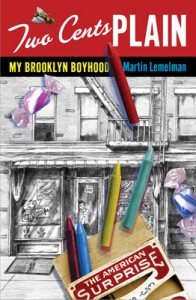 978-1608190041 – Bloomsbury – Hardcover – $26.00.
978-1608190041 – Bloomsbury – Hardcover – $26.00.
Martin Lemelman grew up in the back of a candy store in Brooklyn, NY. He has illustrated more than thirty children’s books and his work has appeared in numerous magazines. Lemelman is now a Professor in the Communication Design Department at Kutztown University and lives in Allentown, Pennsylvania.
Martin’s first memoir done in graphic format, with drawings, photographs of personal objects and places, was Mendel’s Daughter, published in 2006. Told in his mother, Gusta’s voice, the book recounts the story of her life, beginning in pre-war Poland, through her harrowing experience of survival in the Holocaust and displaced persons’ camps, and finally coming to Brooklyn, where she lived with her husband (also a survivor) and two children.
Two Cents Plain is not literally a sequel to Mendel’s Daughter, but it is a continuation of Lemelman’s family storytelling. Two Cents Plain collects the memories and artifacts of the author’s childhood in Brownsville, a neighborhood of Brooklyn filled with Jews speaking Yiddish and children growing up in a comfortable city neighborhood. Later in the story, as times change, Martin and his family’s experience in Brooklyn is not so pleasant. But that’s ultimately the background of the story Lemelman tells. His real focus is the dynamic story of his parents and how their life experiences in the Holocaust shaped them, and of course shaped their children’s experience as a family in post-War America.
Lemelman’s story is full of struggle, his parents were complicated and sometimes difficult for their children to understand, and life in a candy store was never easy. But his Brooklyn memories also is also include the joys of egg creams and comic books, malteds and novelty toys, where the neighbors, the deli man, the fish man, and the fruit man, all are brought to vivid life in story and illustration. The changes in the city during the sixties are very personalized for Martin and his family and in the climax of the story, the family must leave their home once again.
I really loved reading and absorbing this book, the combination of Lemelman’s story telling voice and gorgeous illustrations work beautifully to transport the reader into another time and place. And the author does a fine job of balancing between the sentiment of memory of his childhood with the clarity of the adult rememberer, which is keeps us anchored as the story unfolds. There are layers of memory, emotion, people and place that are richly evoked in this book.
In our interview, I wanted to explore with Martin not only the story of his life and his parents gripping and sometimes painful experiences, but the period of the fifties and sixties and how he used the graphic memoir form to reflect and amplify the power of his story. This is a unique and wonderful book whose creator is quite cogent about his work. Martin has put together a very interesting and useful website for the book that is worth visiting (most useful after you have read the book, I think). I am looking forward to reading the next book in this series of memory stories.
Podcast: Play in new window | Download
Publishing Talks: David Wilk interviews John Oakes
October 26, 2010 by David
Filed under Ebooks and Digital Publishing, PublishingTalks, The Future
 In this series of interviews, called Publishing Talks, I have been talking to book industry professionals and other smart people about the future of publishing, books, and culture. This is a period of disruption and change for all media businesses. We must wonder now, how will publishing evolve as our culture is affected by technology, climate change, population density, and the ebb and flow of civilization and economics?
In this series of interviews, called Publishing Talks, I have been talking to book industry professionals and other smart people about the future of publishing, books, and culture. This is a period of disruption and change for all media businesses. We must wonder now, how will publishing evolve as our culture is affected by technology, climate change, population density, and the ebb and flow of civilization and economics?
I hope these Publishing Talks conversations will help us understand the outlines of what is happening, and how we might ourselves interact with and influence the future of publishing as it unfolds.
These interviews give people in and around the book business a chance to talk openly about ideas and concerns that are often only talked about “around the water cooler,” at industry conventions and events, and in emails between friends and they give people inside and outside the book industry a chance to hear first hand some of the most interesting and challenging thoughts, ideas and concepts being discussed by people in the book business.
OR Books was founded in 2009 by two very experienced book publishing veterans, Colin Robinson and John Oakes, who realized that after many years, that the way books have been published and sold in the 20th century no longer applies in the 21st. John’s description of their new venture (as told to O’Reilly Radar for their “TOC Evolvers” series) goes like this:
OR Books is driven by two concepts. Well, three. One: the current system of distribution and production, returns and discounts, in publishing doesn’t work for stores, authors, or publishers. Two: we will publish politically progressive and culturally adventurous work. Three: the classic rules of publishing still hold true: you need good editing, design, and marketing.
To address the first concept, we decided to scratch the Byzantine rules that surround the distribution and production of books: we sell straight to consumers, do intensive marketing, and then license the book to “traditional publishers.” We generally do not sell to wholesalers or booksellers, be they independent, Amazon, or Barnes & Noble. We are “platform agnostic,” offering consumers their books as ebooks or in physical, printed form. They choose.
I originally wanted to interview both John and Colin together, but the timing did not work out. Colin was someplace exotic like London, so I talked to John in his tiny home office in Manhattan. We had a great talk, as there is alot to talk about. Alert to listeners, and while this is the longest Publishing Talks interview I have done, at about 45 minutes long, I think well worth the investment of time and you can always listen to it in more than one sitting.
OR Books was founded by John Oakes and Colin Robinson as a publishing company embracing e-books and other new technologies. They have already published some excellent (and timely) books, their first being Going Rouge (a great book to launch with), Eileen Myles’ riveting novel Inferno, and Doug Rushkoff’s new Program or be Programmed. Their work is political, cultural, and literary, and so far has been terrifically interesting work.
John Oakes co-founded the publishing company Four Walls Eight Windows. When his company was purchased by the Avalon Publishing Group, he became publisher of Thunder’s Mouth Press, co-publisher of Nation Books, and vice president of Avalon. Among the authors he has published are Andrei Codrescu, Sue Coe, R. Crumb, Cory Doctorow, Andrea Dworkin, Abbie Hoffman, Gordon Lish, Harvey Pekar, Rudy Rucker, John Waters and Edmund White. Oakes serves on the board of PEN America. He has written for the Associated Press, the International Herald Tribune, and the Review of Contemporary Fiction.
Colin Robinson was until recently a senior editor at Scribner. Previously he was managing director of Verso Books and publisher of The New Press. Among the authors he has published are Tariq Ali, Noam Chomsky, Alexander Cockburn, Mike Davis, Norman Finkelstein, Eduardo Galeano, Eric Hobsbawm, Lewis Lapham, Mike Marqusee, Rigoberta Menchú, Matt Taibbi and Jann Wenner. He has written for a broad range of publications including The New York Times, The Sunday Times (London) and The Guardian (London) and has appeared on a wide range of broadcast media including NPR (“On the Media”), CNN, MSNBC, CBC and CSPN.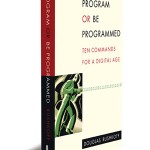
Podcast: Play in new window | Download
